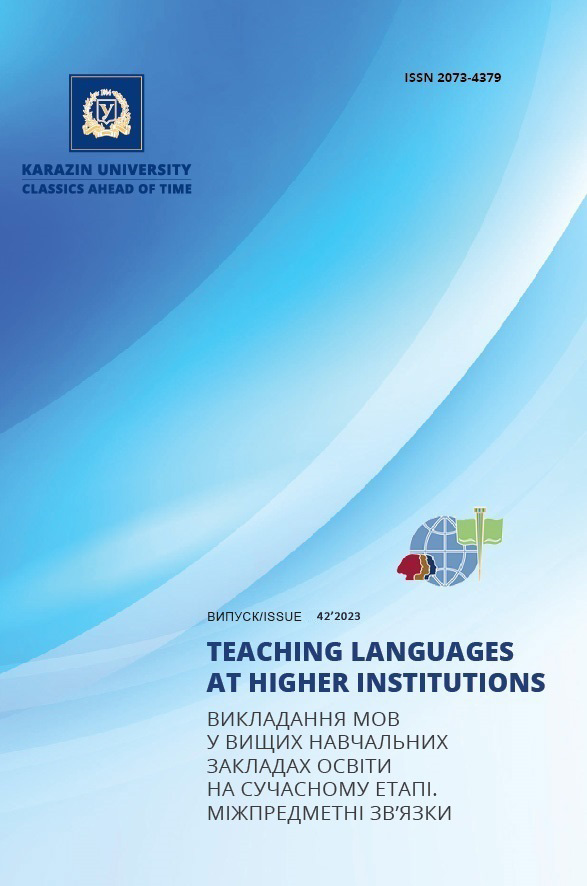Foreign language lessons in an institution of higher education as an important factor in the formation of studentsʼ leadership competence
Abstract
The article examines the specifics of leadership competence formation during the teaching of a foreign language in a higher educational institution. The urgency of the problem stated in the article is due to the need to train a new generation of leading specialists with high foreign language proficiency and preparedness for effective activity in a dynamic external environment. The purpose of the research is to study the specifics of leadership competence formation in the process of teaching a foreign language in higher educational institutions. The object of this study is the process of teaching a foreign language in a higher educational institution, while the subject is the need to develop leadership competence among students. The study paid special attention to the analysis of the concept of “leadership competence.”
The methodological approach in this study is a qualitative combination of theoretical research methods. Analysis, synthesis, interpretation, generalization, and abstraction were used to determine theoretical approaches to explaining the concept of “leadership competence” and revealing its content. Comparative-historical, problem-comparative, and structural methods were applied to analyze the specifics of the process of forming leadership competence using active learning methods during the teaching of a foreign language in a higher educational institution.
The main results of this scientific research substantiate the effectiveness of using active methods of learning a foreign language for the formation of studentsʼ leadership competence in higher educational institutions. The results and conclusions of this study are of practical value for foreign language teachers in vocational pre-university education and higher education institutions, as well as for teachers, methodologists, and other pedagogical workers who are involved in the study of student leadership and the formation of leadership competence in the younger generation at the current stage.
Downloads
References
Volkivska, D.A. (2014). The modern approaches to the leadership definition. Bulletin of the Chernihiv National Pedagogical University. Series: Pedagogical sciences. 115, pp. 45–47 [in Ukrainian].
Yeromenko, I. (2022). Metadisciplinary method in teaching a foreign language at a higher education institution. Scientific Works of Interregional Academy of Personnel Management. Philology. 1, pp. 18–23. DOI: https://doi.org/10.32689/maup.philol.2022.1.3 [in Ukrainian].
Kuziv, M. (2018). Role plays on employment after foreign language as method of studies of foreign communication. Scientific Notes of Ostroh Academy National University: Philology Series. 1 (25), pp. 196–197 [in Ukrainian].
Lebid, N. (2016). Rozvytok liderskyx kompetencij vykladachiv u systemi pidvyshhennya kvalifikaciyi (na dosvidi Kyyivskogo universytetu imeni Borysa Grinchenka) [Development of leadership competencies of teachers in the system of professional development (on the experience of Kyiv University named after Borys Grinchenko)]. Universities and leadership. 3, pp. 45–57 [in Ukrainian].
Lishtaba, L.V. (2016). Features of formation of the key leadership competencies in managers of the health care sector. Scientific Bulletin of Kherson State University. Series: Economic Sciences. 20, part 1, pp. 119–121 [in Ukrainian].
Muxina, K.A., Denysenko, Ya.A., Shtuchenko, I.Ye. (2019). Psychological principles of formation of studentsʼ leadership qualities. Psychological tools for developing the leadership potential of modern youth: theory and practice: materials of the scientific and practical conference, October 17, 2019. Kharkiv: National Technical University “Kharkiv Polytechnical Institute”, pp. 21–22 [in Ukrainian].
Reyda, O.A., Ivlyeva, K.S. (2021). Keys-metod yak odyn iz nayefektyvnishykh zasobiv aktyvizatsiyi vykladannya inozemnoyi movy [The case method as one of the most effective means of revitalizing foreign language teaching]. Aktualni problemy osvitno-vykhovnoho protsesu v umovakh karantyn obmezhen ta dystan navchannia [Actual problems of the educational process in the contracts of a long-distance]. Pp. 89–91. Available at: https://repo.btu.kharkov.ua//handle/123456789/11452 [Accessed 1 March 2023] [in Ukrainian].
Rybalko, L.M. (2019). Formation of leadership competence in future specialists of physical therapy, occupational therapy. Modern education: methodology, theory, practice. Dnipro: Aktsent, pp. 193–195 [in Ukrainian].
Khmyzova, O.V. (2012). Aktualizatsiya liderskoho potentsialu studentskoyi molodi u protsesi vyvchennya inozemnykh mov za profesiynym spryamuvannyam [Actualization of the leadership potential of student youth in the process of learning foreign languages in a professional direction]. Actual problems of psechology. Vol. 6 (8), pp. 215–223 Available at: http://appsychology.org.ua/data/jrn/v6/i8/23.pdf [Accessed 1 March 2023] [in Ukrainian].
Tsepko, T. (2018). Application of interactive technologies in teaching English. Youth & market. 12 (167), pp. 116–120. DOI: https://doi.org/10.24919/2308-4634.2018.155568 [in Ukrainian].
Shlikhtenko, Yu. (2022). Pedagogical aspects of formation of leadership competence of future teachers of foreign languages. Young Scientist. 4.1 (104.1), pp. 72–75. DOI: https://doi.org/10.32839/2304-5809/2022-104.1-18 [in Ukrainian].
Shtelmakh, O.V. (2013). The method of projects in foreign languageʼs teaching of students of unphilological specialities during extracurricular work. Pedagogic science: theory, history, innovation technology. 6 (32), pp. 289–298. URL: http://library.sspu.edu.ua/wp-content/uploads/2018/04/PN_6_32_2013.pdf#page=289 [Accessed 1 March 2023] [in Ukrainian].
Abbas, A. (2013). Integrating the English language teaching and learning process with soft skills. International Conference on Education and Language (ICEL). Indonesia: Bandar Lampung University. Vol. 2, pp. 356–371.
Dirani, Khalil, M., et al. (2020). Leadership competencies and the essential role of human resource development in times of crisis: a response to Covid-19 pandemic. Human Resource Development International. 23.4, pp. 380–394. DOI:10.1080/13678868.2020.1780078.
Lucas Stephen, E. (1995). The Art of Public Speaking. McGraw-Hill. Pp. 270–276.
Mathews, J.A. (2013). Greening of Development Strategies. Seoul Journal of Economics. Vol. 26, no. 2, pp. 147–172.
Morpurgo, M.T. (2015). Beyond Competency: the Role of Professional Accounting in Education in the Development of Meta-competencies. Doctorʼs thesis. Athabasca University.

